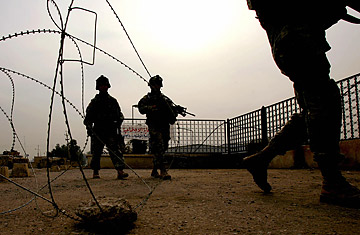
U.S. soldiers on patrol in Mahmudiya in 2005
Part 6 of TIME's Return to Baghdad series.
As we drive through what used to be known as the Triangle of Death, Nate Rawlings tells me about his near death experiences as a U.S. soldier patrolling Highway 1 south of Baghdad. His life was under constant threat, from roadside bombs, insurgent snipers, and al-Qaeda suicide bombers. But the last time I was in this area, in early 2005, my main fear was being killed by someone like Rawlings!
The Triangle is a Sunni-dominated buffer between the Iraqi capital and the Shi'ite south. It was where an alphabet soup of insurgent groups, working in tandem or in cooperation with al-Qaeda, fought a long guerilla war against U.S.-led coalition forces. The area around Mahmudiya city was especially volatile, and didn't really calm down until late in 2008, when the U.S. military persuaded the last insurgent holdouts to join the "Sons of Iraq" program and drive out al-Qaeda.
I remember the chilly dawn my translator and I drove out of Baghdad and, taking mostly dirt tracks, made it to a small hamlet near Mahmudiya for a meeting of tribal chiefs. They had gathered to discuss some feuds that had broken out between insurgent groups, mainly over turf. The meeting took place in a surprisingly well-appointed home in the middle of nowhere. It was furtive and hurried: everyone was concerned that a squad of American soldiers would come crashing through the date-palms and begin a firefight that could have only one outcome. There was a lot of gallows humor, with sheikhs and their bodyguards speculating about how many bullets it would take to finish off the more portly attendees. I don't think I was able even to summon a polite smile.
The Americans didn't turn up, and the meeting ended with promises of better understanding and cooperation between the tribes. We made it back to Baghdad without incident.
This time around, our trip was entirely lacking in skullduggery. Mahmudiya, as city councilman Najim Mehdi al-Duleimi boasted to us, is "one of the safest places in Iraq." There are rumors of a lingering al-Qaeda presence, but no real evidence of it. Highway 1 is one of Iraq's better roads, and there was relatively little traffic as we drove through Rawlings' old stomping grounds. There were even makeshift shops along the road, selling cold drinks and snacks — unthinkable even two years ago.
Wherever we stopped to talk to villagers, their recollection of the Americans was mixed: some remembered the late-night raids, doors broken down and men hauled off to prison without explanation; others talked of friendlier encounters with soldiers (typically these occurred after the "surge" of 2007).
The Iraqi government doesn't get very high marks here: people complain of the lack of services like water and electricity. They also say Iraqi military units sometimes treat them as harshly as the Americans did.
This being Sunni country, there's disquiet over the political developments in Baghdad, where it now looks possible a coalition of Shi'ites and Kurds will form the new government. There's also resentment that the government has been slow to keep its end of the bargain with the Sons of Iraq: many former insurgents say they haven't been given government jobs. Some complain the jobs offered were too demeaning. In the hamlet of al-Salaam ("Peace"), a man who gave his name only as Fadel waved his hand dismissively in the general direction of Baghdad, saying, "They expect me to clean toilets in some government office? Never!"
A combination of political exclusion and broken promises is dangerous, especially in a place that still takes pride in the fact it was called the Triangle of Death. Mahmudiya is safe today, but given our personal experience of its recent history, Rawlings and I aren't betting it will stay that way.
